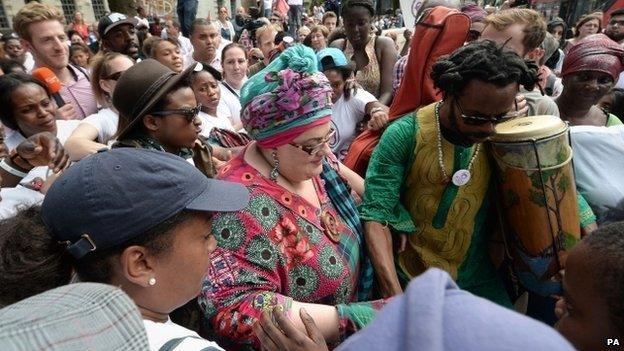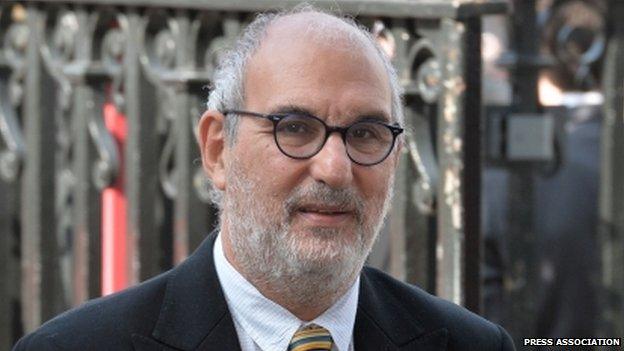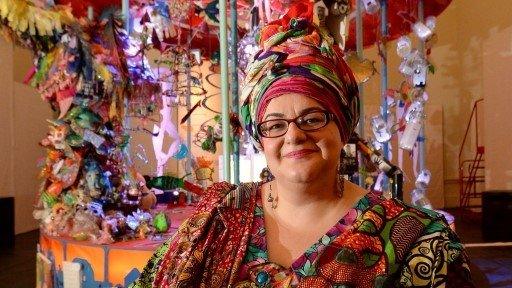Kids Company warned its closure could cause 'rioting'
- Published
- comments

Camila Batmanghelidjh at a protest in support of the charity shortly after its closure
As central government, local authorities and charities pick up the pieces of Kids Company, the charity which collapsed insolvent in early August, new details are emerging of the discussions that preceded the Cabinet Office paying a controversial £3m grant to the charity in late July - just days before it closed its doors.
BBC Newsnight and BuzzFeed News have learned of a document, emailed to civil servants in the name of Alan Yentob, chair of the charity's trustees, on 2 June. It warned that a sudden closure of the charity would mean a "high risk of arson attacks on government buildings".
The document also warned of a high risk of "looting" and "rioting", and cautioned that the "communities" served by Kids Company could "descend into savagery". The document was written in language that civil servants across government described as "absurd", "hysterical" and "extraordinary".
The document was the first part of the case made by Kids Company, which sought to help young people up to the age of 24, for the £3m grant. It was part of a proposal that the financially troubled charity should be restructured into a much smaller "child wellbeing hub", which could survive on a smaller income.
The Cabinet Office has acknowledged receiving a copy of the document, which was also sent to at least two London local authorities. The central government department has, however, declined to comment beyond noting that this document was not the basis upon which the charity was given the £3m grant.
In a statement issued on Tuesday, Mr Yentob, also the BBC's creative director, said: "The document... was an appendix written by the Safeguarding Team, who set out all the potential risks to be taken into account in the event of closure."

Alan Yentob, chair of the trustees at Kids Company, and creative director at the BBC
'High risks' attached to closure
The document sent to the Cabinet Office said: "We have created a structure which acts as a substitute parent and extended family. The endings of these relationships will be therefore potentially equivalent to death of the primary care giver i.e. a mother, a father and/or the whole extended family within a biological familial structure.
"The impact of such termination will be devastating for each child in their own way. In our scenario, these children will have no emergency aid agency or rescue team set up for them to acknowledge the turmoil closure will bring for them."
After explaining the potential trauma for clients, the document then went on to list "risks posed to the public", saying there was a "high risk" of looting, rioting and arson attacks on government buildings. The same section also listed "increases" in knife and gun crime, neglect, starvation and modern-day slavery as possible dangers.
The document also says: "We are... concerned that these children and families will be left without services in situations of sexual, psychological or emotional abuse, neglect and malnutrition and facing homelessness and further destitution."
It continued: "Our cause for concern is not hypothetical, but based on a deep understanding of the socio-psychological background that these children operate within. We know that the referrals will not get picked up and be dealt with. We know that there are not enough voluntary agencies equipped or staffed to deal with the challenging behaviour that our client group possesses.
"Without a functioning space for hope, positivity and genuine care, these communities will descend into savagery due to sheer desperation for basic needs to be met."
Local authority officials and councillors have expressed anger and bemusement at this claim, in particular.
The £3m question
MPs expect a formal investigation into the £3m disbursal to the charity. The money was received by the charity less than a week before its sudden closure on 5 August.
This grant was paid against the advice of the department's lead civil servant. Richard Heaton, the Cabinet Office permanent secretary, sought a "ministerial direction" - a means of registering his dissent - at the payment over concerns about the charity's management.
He wrote a letter setting out his concerns, based in part on Kids Company's failure to meet conditions attached to a grant of £4.3m paid in April.
Oliver Letwin and Matthew Hancock, ministers at the Cabinet Office, decided to give the money to the charity despite Mr Heaton's misgivings.
But as BBC Newsnight and BuzzFeed News revealed in July, they demanded that Camila Batmanghelidjh, the charity's chief executive, step down from her role as a condition of the payment.
Officials now expect to recover only £1.8m - a loss of £1.2m which, according to internal emails from the charity, prolonged the life of the charity by just five working days.
Bigger questions to answer
Officials in central and local government have also told BBC Newsnight and BuzzFeed News that they have been taken aback by the difficulty in establishing how much work the charity actually did. The organisation had claimed to "intensively" help 18,000 young people and to "reach" 36,000.
The charity also said that its records showed that it supported 15,933 young people. Speaking to Radio 4's The Report on August 5, Ms Batmanghelidjh had said that the figure of 15,933 represented "the most high-risk group of kids, that's what's sucking up all our money". All of these clients, she said, had "keyworkers" allocated to them.
However, the charity has handed over records to local government relating to just 1,692 clients in London, of which the charity had designated 331 as "high-risk". Officials in Bristol have been given details of a further 175 clients. Ms Batmanghelidjh has told The Sunday Times that she has kept back some records of clients who are at risk of deportation, external.
Mr Yentob, in his statement, added: "Despite the support of local authorities, many of those who received support and refuge from Kids Company remain at risk. The welfare and safety of both the young people and the communities in which they live continues to be of great concern."
Investigations by MPs and the National Audit Office are now expected into the Cabinet Office's decisions.
Meanwhile, the Charity Commission is looking into Kids Company's management and governance, while the Metropolitan Police is also conducting an investigation involving the charity. Their inquiry is being led by the complex case team of the Sexual Offences, Exploitation and Child Abuse Command.
- Published21 August 2015
- Published1 February 2016
